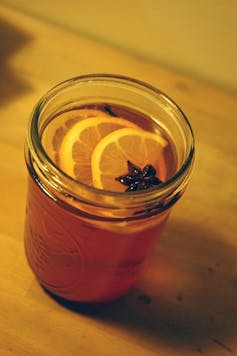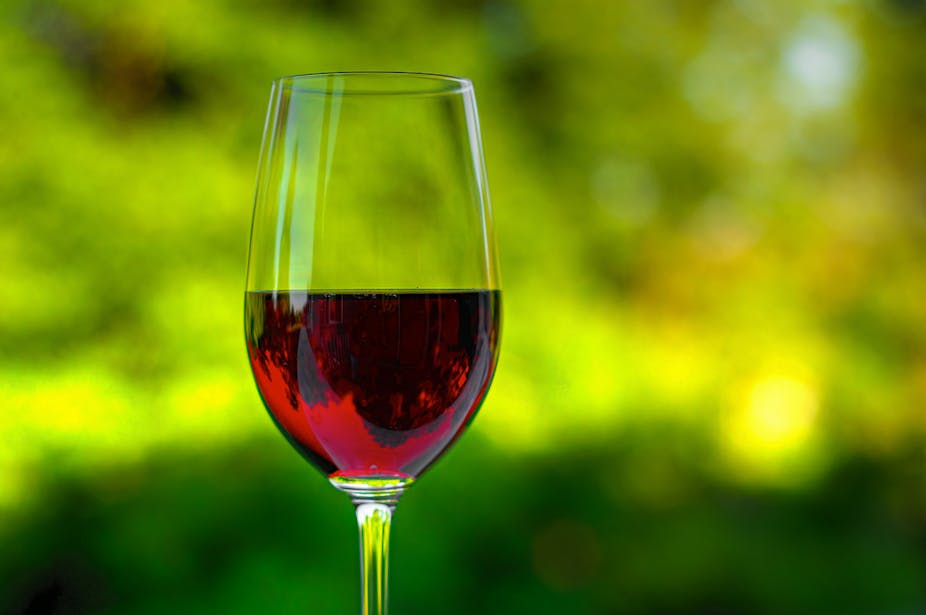Since the late Stone Age, people have been drinking alcohol to help them feel better. For the most part, this has been in order to “remember their misery no more” (Proverbs 31:6-7). But it’s widely believed alcohol also has a range of medical virtues.
Many studies have found that people who regularly consume a small amount of alcohol have a lower incidence of heart disease, stroke, diabetes and some cancers when compared to those who don’t drink at all or drink only occasionally.
By a small amount – we’re talking about having no more than one or two drinks most days for men and half this for women, whose blood-alcohol levels tend to be higher after drinking the same amount.
Of course, moderate drinking takes discipline and self awareness. So it’s hardly surprising these are also the kind of people who have fewer health problems.
How might it work?
Nonetheless, researchers have repeatedly attempted to establish the direct actions of drinking on health and well-being.
For example, alcohol has favourable effects on HDL cholesterol. This is also known as “good cholesterol” because people with high levels of HDL cholesterol have lower risks of heart disease and stroke.
But if this was how alcohol works, why would more selective strategies to increase HDL cholesterol be universally unsuccessful in preventing heart disease?

A glass before or during an evening meal is often said to be the most beneficial. This may be partly because this social pattern of drinking is easier to regulate and habituate. Alcohol is also less intoxicating with food in the stomach.
However, drinking with food also slows down stomach emptying. This may have health benefits by slowing the flux of sugars and fats into the bloodstream and their subsequent burden on the body.
Many alcoholic drinks also contain antioxidants, not just red wine. In fact, some beers and ciders also have quite high levels of antioxidants, some of which may better absorbed or more potent than those in wine.
But again, the medicinal effects of regularly taking the amounts of antioxidants found in a single glass every day are unclear. Even when taken in high doses as supplements, there is little evidence of health benefits.
Is wine better than beer or spirits?
In some head-to-head trials red wine seems to outperform beer or spirits with respect to surrogate markers of health, such as vascular stiffness and oxidative stress.
However, when you look at overall health outcomes in moderate wine drinkers, they appear to be much the same as those in moderate beer drinkers or those who have a glass of scotch or gin every night.
But this does not mean they are equally healthy, overall. In fact, one reason wine gets all the kudos is that the lifestyle factors that permit a regular but limited intake are more common with wine drinkers.
Certainly, beer has some advantages because there is less alcohol in a can, which you can finish while the bottle of wine remains temptingly open. Light beers also have expediency as the potential for intoxication and abuse is reduced, along with the alcohol content. Many also contain fewer calories, while retaining both flavour and flavanoids.
The downward slide
Before you start thinking a having a drink or two may be good for you, it is literally sobering to remember that excessive drinking is a leading cause of preventable death, particularly in young adults and men, but also increasingly, in women. Excess alcohol contributes to the global burden of disease to a greater extent than smoking.

Alcohol inhibits the functions of the brain, especially at the front end where we think through what we are doing. When this area is intoxicated, we lose some of our inhibitions. This is why alcohol seems relaxing and takes away (thoughts of) our worries. But this can also lead to bad choices, such as dancing on tables, violence or driver error.
Consume more alcohol and other areas of the brain are also affected, leading to disturbed balance, slurred speech, blurred vision and other symptoms recognisable as being drunk.
Heavy drinkers have more heart disease, hypertension, dementia and [some cancers](https://theconversation.com/health-check-does-alcohol-cause-cancer-22959](especially breast and colon cancer). Even episodic binge drinking is associated with an increased risk of chronic disease.
Rather than alcohol being toxic, these associations are more likely due to the characteristics of people who drink more (their mood, their stress, their lifestyle, their self control, and so on) when compared to those who drink in moderation or don’t drink at all.
Alcohol, like food, should be one of life’s shared pleasures. But both need restraint. A little glass can easily become more, especially if the bottle is already open. And sometimes, its far healthier to not drink at all than go down this slippery slope.

